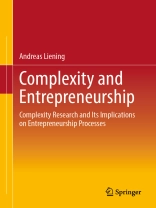Starting from the question of what systematic peculiarities in the behavior of leaders and entrepreneurs need to be considered, this book provides a new theoretical perspective for entrepreneurial analysis, evaluation, decision-making, and action. Various theories of complex systems, such as the theory of self-organization (synergetics), are presented. Additionally, methodological approaches for the empirical examination of complexity and the resulting consequences in the field of entrepreneurship are discussed. Overall, it suggests that old models like the Laplacean worldview or Kant’s question of what we can know need to be reconsidered. This book offers surprising answers, particularly revealing new opportunities and possibilities in complex processes like starting a business.
The second expanded and updated edition strengthens the focus on entrepreneurship as the book’s main theme. It includes new and current examples from the real economy, as well as additional empirical data supporting the model analysis.
Spis treści
Background and history.- Theory and empiricism.- Recent developments in complexity research.- Multi-perspective.- Entrepreneurship and complexity.- Conclusion.- On the necessity of complexity science approaches in the field of entrepreneurship.
O autorze
Prof. Dr. Andreas Liening is a Professor of Entrepreneurship and Economic Education at TU Dortmund. He primarily engages in the discussion of complexity science in the field of entrepreneurship.












